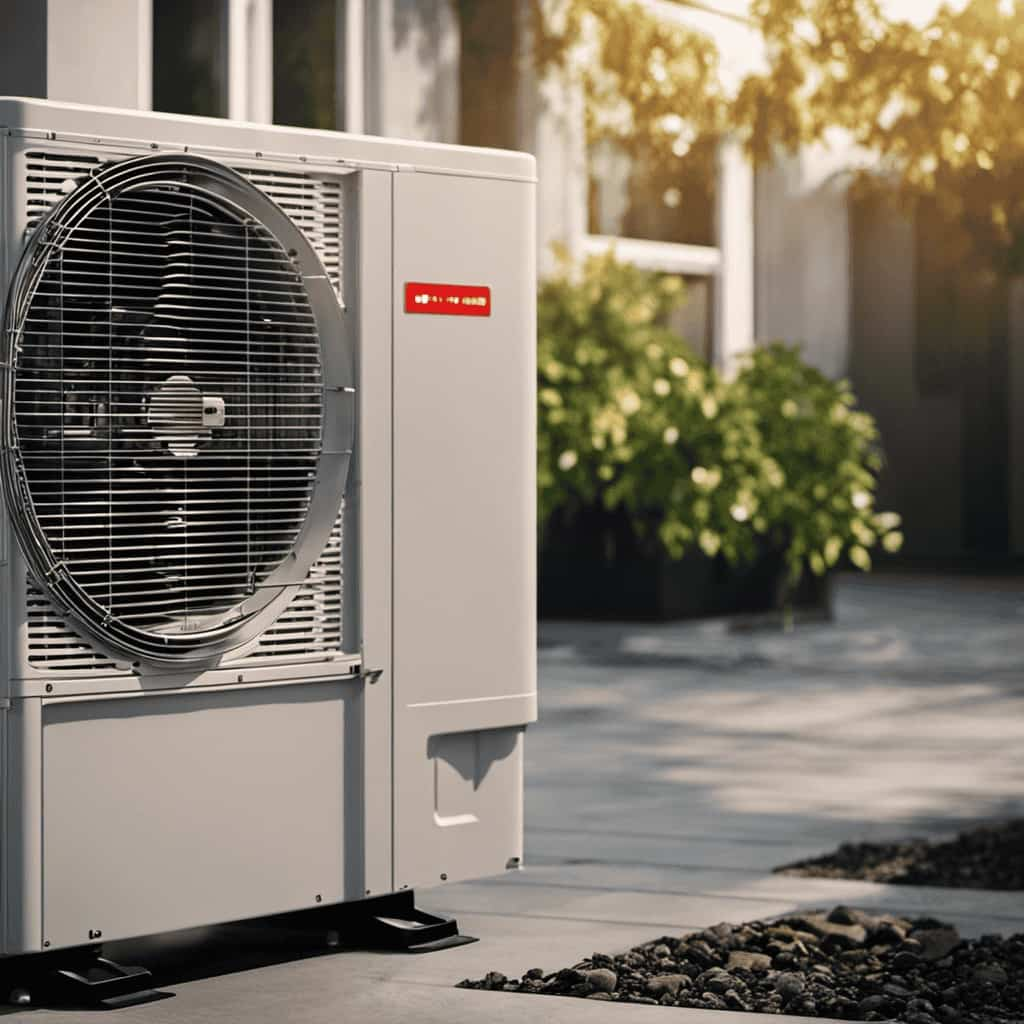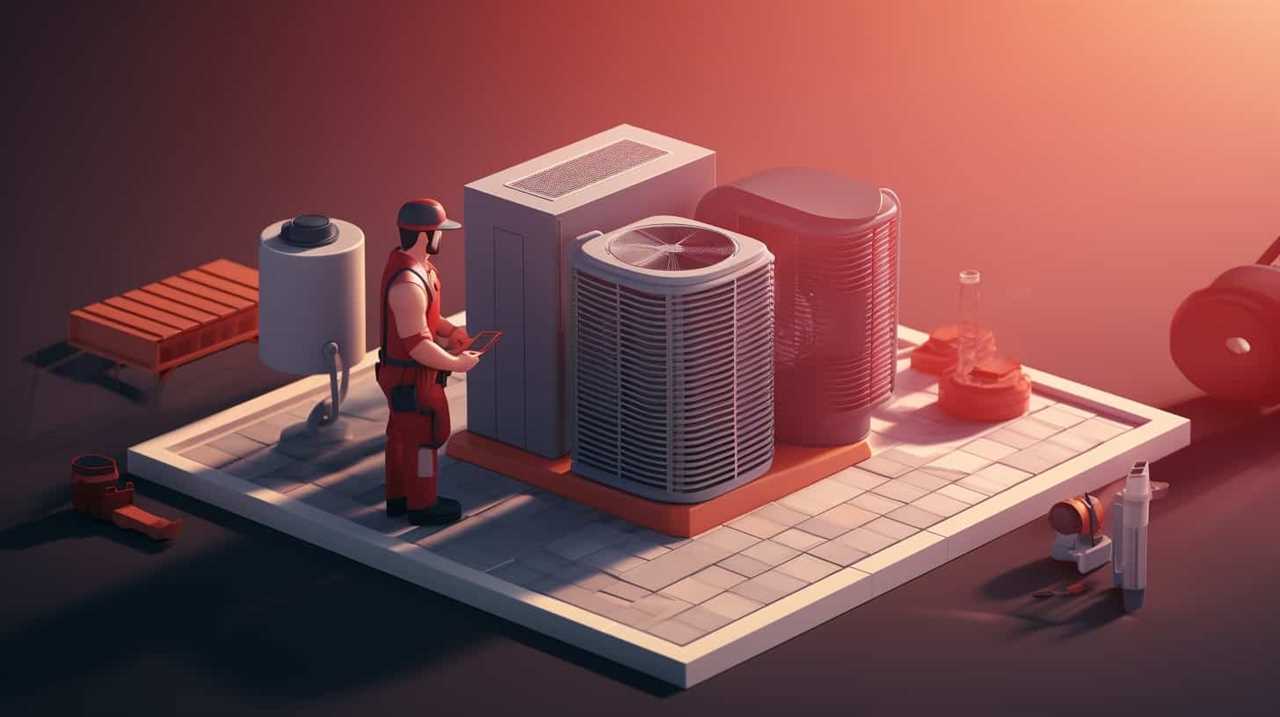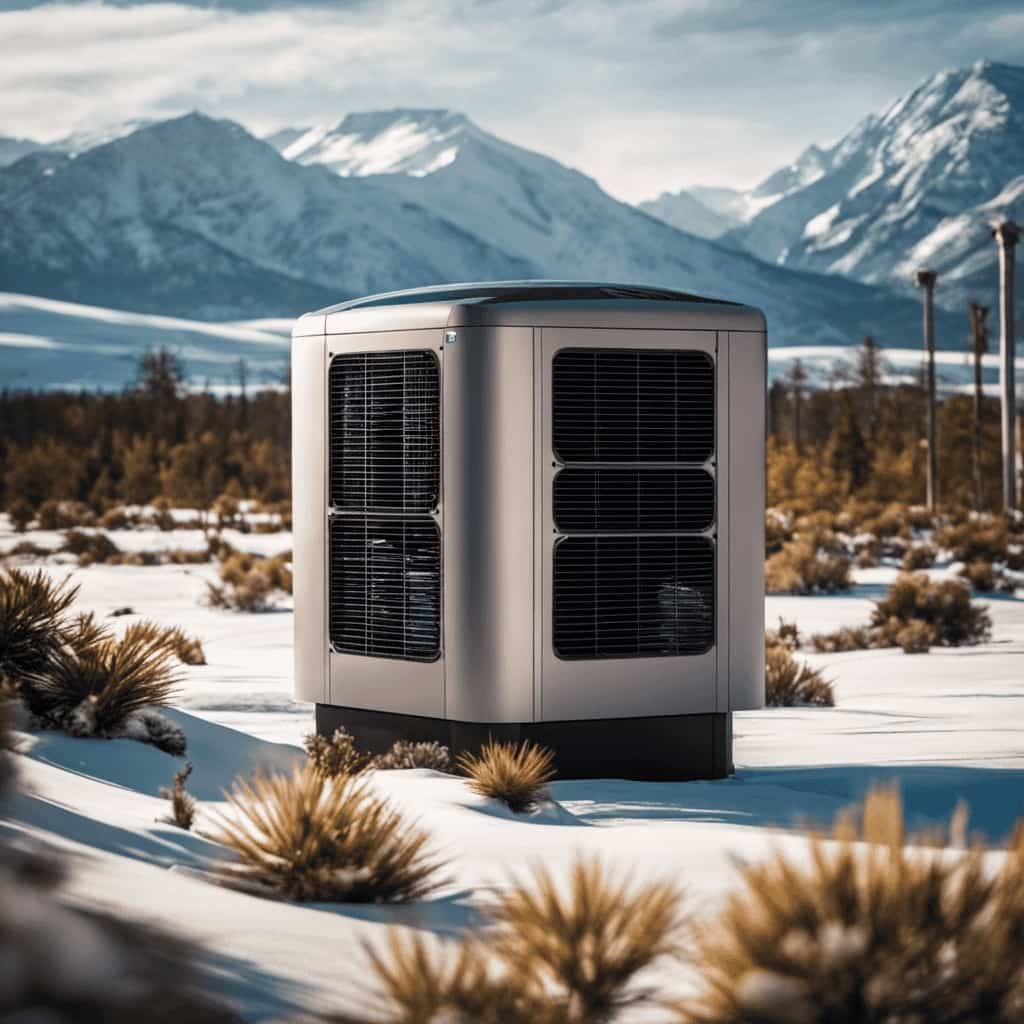Are you sick of feeling cold in your own house? Stop searching! We’re here to transform your comfort by optimizing heat pump effectiveness.
In this article, we’ll guide you through the basics of heat pumps, help you choose the right size for your home, and provide tips on optimizing operation for maximum efficiency.
With regular maintenance and proper insulation, you’ll be able to enjoy a warm and cozy home all year round.
Let’s get started!

Key Takeaways
- Heat pump maintenance is crucial for optimal performance and energy efficiency.
- Choosing the right size heat pump for your home is essential for efficiency and comfort.
- Setting the thermostat to the recommended temperature of 68 degrees Fahrenheit can optimize heat pump operation.
- Utilizing energy-saving features and other efficiency enhancements can maximize heat pump efficiency and reduce energy bills.
Understanding Heat Pump Basics
We’ll start by explaining the basics of how a heat pump works. A heat pump is a device that transfers heat from one place to another, providing heating or cooling for a space. It works by extracting heat from the air, ground, or water, and then transferring it to the desired location.
Heat pump installation involves selecting the right size and type of heat pump for your specific needs, as well as ensuring proper placement and connection to the existing heating or cooling system.
Regular heat pump maintenance is crucial to ensure optimal performance and energy efficiency. This includes cleaning or replacing air filters, checking refrigerant levels, and inspecting the system for any signs of wear or damage.
Choosing the Right Size Heat Pump for Your Home
To ensure optimal performance, it’s crucial to choose the right size heat pump for our home. When it comes to heat pump installation, proper sizing is essential for efficiency and comfort. Here are four factors to consider when determining the right size heat pump for your home:

-
Square footage: Calculate the total square footage of your home to determine the heat pump capacity needed.
-
Climate: Consider the climate of your region. Warmer climates require less heating capacity, while colder climates require more.
-
Insulation: Evaluate the insulation in your home. Well-insulated homes may require a smaller heat pump, while poorly insulated homes may need a larger one.
-
Window and door quality: Assess the quality of your windows and doors. Energy-efficient windows and doors can affect the heat loss or gain in your home, impacting heat pump sizing.

Optimizing Heat Pump Operation for Maximum Efficiency
When it comes to optimizing heat pump operation for maximum efficiency, there are several key points to consider.
First, setting the ideal temperature is crucial in order to balance comfort and energy consumption.
Additionally, proper maintenance techniques, such as regular filter cleaning and system inspections, can greatly impact the efficiency of your heat pump.
Lastly, understanding and utilizing energy-saving features, such as programmable thermostats and variable-speed compressors, can further enhance the overall efficiency of your system.

Ideal Temperature Settings
Our recommended temperature setting for maximum heat pump efficiency is 68 degrees Fahrenheit. By programming your thermostat to this temperature, you can optimize the operation of your heat pump while minimizing energy consumption.
Here are four reasons why this temperature setting is ideal:
-
Energy Efficiency: Setting your thermostat to 68 degrees Fahrenheit allows your heat pump to work efficiently without excessive energy consumption.
-
Comfort: This temperature provides a comfortable indoor environment for most individuals while still being energy-conscious.

-
Cost Savings: Maintaining a consistent temperature of 68 degrees Fahrenheit can help lower your heating costs.
-
Heat Pump Lifespan: By operating your heat pump at this temperature, you can potentially extend its lifespan and reduce the need for repairs or replacements.
Proper Maintenance Techniques
Regular maintenance is essential for maximizing the efficiency of your heat pump and ensuring optimal operation. By following proper maintenance procedures and employing effective troubleshooting techniques, you can enhance the performance and longevity of your heat pump.
One important maintenance task is regularly cleaning or replacing the air filters. Clogged filters can restrict airflow and decrease efficiency.

Additionally, inspecting and cleaning the outdoor unit is crucial to remove any debris or obstructions that could hinder its function. It’s also recommended to check the refrigerant levels and ensure they’re within the manufacturer’s specifications.
Regularly inspecting electrical connections, lubricating moving parts, and testing the thermostat can help identify and resolve potential issues before they become major problems.
Energy-Saving Features Explained
We can maximize heat pump efficiency by utilizing energy-saving features and optimizing its operation. By taking advantage of smart technology and energy-saving features, we can ensure that our heat pump operates at its highest level of efficiency. Here are four key energy-saving features explained:
-
Programmable Thermostat: This feature allows you to set different temperatures for different times of the day, ensuring that your heat pump is only running when needed.

-
Variable Speed Compressor: This feature adjusts the speed of the compressor based on the heating or cooling demands of your home, resulting in energy savings and increased comfort.
-
Dual Fuel Capability: This feature allows your heat pump to switch to a backup heating source, such as a gas furnace, when outside temperatures drop too low for efficient heat pump operation.
-
Energy Monitoring: Some heat pumps have built-in energy monitoring capabilities, allowing you to track your energy usage and make adjustments to optimize efficiency.
By understanding and utilizing these energy-saving features, we can ensure that our heat pump operates at maximum efficiency, resulting in lower energy bills and increased comfort.

Now, let’s explore some regular maintenance tips for a well-functioning heat pump.
Regular Maintenance Tips for a Well-Functioning Heat Pump
To ensure optimal performance and extend the lifespan of your heat pump, regular maintenance is essential. Seasonal upkeep essentials include:
- Cleaning or replacing air filters
- Inspecting and cleaning the outdoor unit
- Checking the refrigerant levels
Troubleshooting common issues such as abnormal noises, insufficient heating or cooling, or frequent cycling can help identify potential problems and prevent costly repairs.
Seasonal Upkeep Essentials
Our maintenance checklist outlines essential tasks for keeping your heat pump in optimal condition throughout the year. Regular servicing and proper cleaning are crucial to ensure the efficiency and longevity of your heat pump. Here are the seasonal upkeep essentials you need to include in your maintenance routine:

-
Clean or replace air filters: Clogged filters restrict airflow and reduce efficiency. Cleaning or replacing them regularly promotes better performance.
-
Inspect and clean outdoor unit: Remove any debris or vegetation around the outdoor unit, and clean the coils to prevent airflow blockages.
-
Check refrigerant levels: Low refrigerant levels can indicate a leak and reduce heat pump efficiency. Regularly inspect and top up refrigerant levels as needed.
-
Test thermostat and controls: Ensure your thermostat is calibrated correctly and all controls are functioning properly to maintain accurate temperature settings.

By following these maintenance tips, you can prevent potential issues and maximize the efficiency of your heat pump.
Now, let’s delve into troubleshooting common issues that may arise.
Troubleshooting Common Issues
Let’s address common issues and provide regular maintenance tips to ensure a well-functioning heat pump.
One common issue that homeowners may encounter with their heat pumps is inconsistent temperatures. If you notice that certain areas of your home are significantly warmer or cooler than others, it could be a sign of a problem with your heat pump. This issue could be caused by a variety of factors, such as a malfunctioning thermostat, dirty filters, or a refrigerant leak.

Regularly checking and cleaning your filters, as well as scheduling professional maintenance checks, can help prevent and address these issues.
Another common issue to be aware of is strange noises coming from your heat pump. These noises could indicate problems with the compressor, fan motor, or other components. If you hear any unusual sounds, it’s important to have a qualified technician inspect and service your heat pump promptly.
Insulation and Sealing: The Key to Heat Pump Efficiency
High-quality insulation and proper sealing are crucial for maximizing the efficiency of your heat pump. Without adequate insulation and sealing, your heat pump will have to work harder to maintain the desired temperature, leading to increased energy consumption and higher utility bills.
Here are four key factors to consider when it comes to insulation and sealing:

-
Air leakage: Identify and seal any gaps or cracks in your home’s walls, windows, and doors to prevent air leakage. This will help maintain a consistent temperature and reduce the workload on your heat pump.
-
Insulation materials: Choose insulation materials with a high R-value, such as fiberglass or spray foam, to effectively trap heat and prevent it from escaping. Properly insulating your walls, attic, and floors will improve the overall efficiency of your heat pump.
-
Duct insulation: Insulate your ductwork to prevent heat loss or gain during the distribution of conditioned air. Well-insulated ducts will ensure that the air reaches its intended destination without any energy waste.
-
Vapor barriers: Install vapor barriers in areas prone to moisture, such as basements and crawl spaces, to prevent moisture from seeping into your home. Moisture infiltration can decrease the effectiveness of insulation and lead to mold growth.

Utilizing Programmable Thermostats for Energy Savings
We can achieve energy savings by effectively utilizing programmable thermostats. These devices allow us to schedule temperature adjustments throughout the day, ensuring that we only use energy when necessary. Smart thermostats take this concept even further by learning our habits and adjusting settings automatically for maximum efficiency. By implementing energy-saving strategies with programmable thermostats, we can significantly reduce our heating and cooling costs.
Here is a table that illustrates the benefits of smart thermostats:
| Benefits of Smart Thermostats |
|---|
| Energy savings |
| Increased comfort |
| Remote access and control |
Smart thermostats not only help us save energy, but they also enhance our overall comfort by maintaining consistent temperatures. With remote access and control, we can adjust settings from anywhere using our smartphones, ensuring that our homes are always at the perfect temperature.
Transitioning into the next section, let’s now explore the concept of harnessing the power of heat pump zoning.

Harnessing the Power of Heat Pump Zoning
To optimize heat pump efficiency, we can maximize comfort and energy savings by strategically dividing our home into separate zones. Heat pump zoning offers several benefits and plays a crucial role in optimizing heat pump performance. Here’s how we can make the most out of heat pump zoning:
-
Improved energy efficiency: By creating separate zones, we can heat or cool only the rooms that are in use, reducing energy waste.
-
Personalized comfort: Each zone can be set to different temperatures, allowing individuals to customize their comfort levels.
-
Reduced wear and tear: Heat pump zoning prevents unnecessary cycling, reducing the strain on the system and extending its lifespan.

-
Lower energy bills: By optimizing heat pump zoning, we can significantly reduce energy consumption, leading to lower utility bills.
By harnessing the power of heat pump zoning, we can create a more comfortable and energy-efficient home environment.
Now, let’s explore how we can further enhance heat pump efficiency by supplementing it with solar energy.
Supplementing Heat Pump Efficiency With Solar Energy
By utilizing solar energy, we can enhance the efficiency of our heat pump and reduce our reliance on traditional energy sources. One way to achieve this is through solar panel installation. Installing solar panels on your property allows you to harness the power of the sun and convert it into electricity, which can then be used to power your heat pump. This not only reduces your carbon footprint but also lowers your energy bills.

Additionally, the government offers various incentives to encourage the adoption of solar energy, such as tax credits and rebates. These incentives can offset the initial cost of solar panel installation and make it a more affordable option for homeowners.
Transitioning to the subsequent section, let’s now explore geothermal heat pump systems and their benefits.
Exploring Geothermal Heat Pump Systems
Utilizing geothermal heat pump systems can significantly enhance the efficiency of our heating and cooling systems while reducing our reliance on traditional energy sources. Geothermal heat pumps utilize the constant temperature of the earth to provide heating and cooling for our homes. Here are four key points to consider when exploring geothermal heat pump systems:
-
Geothermal heat pump maintenance: Regular maintenance is crucial to ensure optimal performance and longevity of your geothermal heat pump system. This includes regular filter cleaning or replacement, checking refrigerant levels, and inspecting the system for any leaks or malfunctions.

-
Geothermal heat pump installation: Proper installation is essential for the efficient operation of your geothermal heat pump system. It involves drilling boreholes, installing the heat exchanger, and connecting the system to your home’s heating and cooling distribution network.
-
Energy efficiency: Geothermal heat pump systems are highly energy-efficient, as they rely on renewable energy from the earth. They can provide significant cost savings on energy bills compared to traditional heating and cooling systems.
-
Environmental benefits: By using geothermal heat pump systems, we can reduce greenhouse gas emissions and our carbon footprint. These systems utilize renewable energy sources and produce virtually no emissions, making them an environmentally friendly choice.
Transition: Now that we understand the benefits and considerations of geothermal heat pump systems, let’s explore troubleshooting common issues for improved heat pump performance.

Troubleshooting Common Issues for Improved Heat Pump Performance
When it comes to troubleshooting common issues for improved heat pump performance, there are several key points to consider.
First, inadequate airflow can often be a major cause of reduced efficiency.
Second, thermostat settings play a crucial role in optimizing performance.
Lastly, addressing any refrigerant issues promptly is essential for maintaining the overall functionality of the heat pump system.

Inadequate Airflow Causes
We need to identify and address the causes of inadequate airflow to improve the performance of our heat pump. Proper airflow is crucial for the efficient operation of a heat pump, as it ensures optimal heat transfer and distribution throughout the space.
Here are some common causes of inadequate airflow and possible solutions to consider:
-
Clogged air filters: Dirty filters restrict airflow and reduce system efficiency. Regularly clean or replace filters to improve airflow.
-
Blocked vents: Furniture or other objects obstructing vents can impede airflow. Ensure vents are clear and unobstructed.

-
Duct leaks: Leaky ductwork can result in air loss, reducing airflow. Seal any leaks to improve system performance.
-
Inadequate ventilation: Insufficient ventilation in the space can limit airflow. Consider installing additional vents or using ventilation solutions to enhance airflow.
Thermostat Settings Affecting Efficiency
To optimize the efficiency of our heat pump, we should pay attention to the thermostat settings and how they impact its performance. The ideal temperature range for a heat pump is typically between 68°F and 72°F. Setting the thermostat within this range ensures that the heat pump operates efficiently while still providing comfort.
It’s important to note that the impact of humidity should also be considered. Higher humidity levels can make the temperature feel warmer than it actually is, leading to unnecessary cooling. By adjusting the thermostat to a slightly higher temperature and using a dehumidifier, we can maintain comfort while reducing the workload on the heat pump.

Now, let’s transition into the next section where we’ll discuss how to fix refrigerant issues.
How to Fix Refrigerant?
As we delve into the topic of fixing refrigerant in order to troubleshoot common issues and improve heat pump performance, it’s important to understand the key steps involved in the process. Here are the steps to fix refrigerant and address any refrigerant leakage:
-
Identify the source of the leakage: Inspect the heat pump system and look for any signs of refrigerant leakage such as oil stains or hissing sounds.
-
Repair the leak: Once the leakage is identified, it’s crucial to fix it promptly. This should be done by a professional repair technician who’s the expertise and equipment to handle refrigerant repairs.

-
Recharge the refrigerant: After the leak is fixed, the heat pump system needs to be recharged with the appropriate amount of refrigerant. This ensures optimal performance and efficiency.
-
Perform a system check: Once the refrigerant is fixed and recharged, it’s essential to perform a thorough system check to ensure that everything is working properly.
By following these steps and addressing refrigerant issues promptly, you can improve the performance and efficiency of your heat pump.
Now, let’s explore the next section about upgrading to a high-efficiency heat pump model.

Upgrading to a High-Efficiency Heat Pump Model
Maximizing heat pump efficiency begins with upgrading to a high-efficiency model. Upgrading to a high-efficiency heat pump offers a range of benefits that can significantly improve your comfort and energy savings. These models are designed to operate more efficiently, which means they consume less energy while still providing the same level of heating and cooling performance. By upgrading, you can reduce your energy consumption and lower your utility bills.
Additionally, high-efficiency heat pumps often come with advanced features and technologies, such as variable-speed motors and smart thermostats, which further enhance their efficiency and performance.
When it comes to the installation process, it’s important to consult with a professional HVAC technician to ensure proper sizing and installation. They’ll assess your home’s needs and recommend the right high-efficiency heat pump model for you.
Frequently Asked Questions
What Is the Average Lifespan of a Heat Pump?
The average lifespan of a heat pump depends on various factors such as proper heat pump maintenance and early detection of signs of heat pump failure. It is important to prioritize regular maintenance to maximize its efficiency and longevity.

Can a Heat Pump Be Used for Both Heating and Cooling?
Yes, a heat pump can be used for both heating and cooling. This maximizes heat pump efficiency and provides numerous benefits, such as energy savings and year-round comfort. It’s a versatile solution for all your heating and cooling needs.
How Noisy Are Heat Pumps During Operation?
Heat pump noise levels can vary depending on the model and installation. However, there are several ways to reduce heat pump noise, such as proper insulation, selecting quieter models, and regular maintenance.
Are There Any Rebates or Incentives Available for Installing a Heat Pump?
Rebate programs and incentives are available for installing heat pumps. These programs aim to encourage energy savings and make heat pump installation more affordable. Take advantage of these opportunities to maximize your comfort and reduce your energy bills.
Can a Heat Pump Be Installed in Any Type of Home, or Are There Specific Requirements?
Installing a heat pump in any home requires specific requirements such as adequate space, proper insulation, and compatible ductwork. However, the benefits of heat pump installation, including increased energy efficiency and cost savings, make it worth considering for all homeowners.

Conclusion
In conclusion, revolutionize your comfort by maximizing heat pump efficiency. By understanding the basics, choosing the right size, optimizing operation, and conducting regular maintenance, you can ensure a well-functioning heat pump.
Insulation and sealing play a crucial role in enhancing efficiency, while supplementing with solar energy and exploring geothermal systems can further improve performance.
Troubleshooting common issues and upgrading to a high-efficiency model are additional steps towards achieving optimal heat pump efficiency.
So, seize the opportunity to save energy and enjoy superior comfort.










